- Regulatory Status
- RUO
- Other Names
- wingless-type MMTV integration site family, member 3A, Wnt-3a, vt
- Ave. Rating
- Submit a Review
- Product Citations
- publications
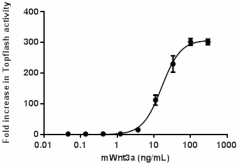
-

Mouse Wnt3a induces Topflash reporter activity in HEK293T human embryonic kidney cells with ED50 range of 7 - 35 ng/mL. -

Stability testing for mouse Wnt3a. An aliquot of mouse Wnt3a was kept at 4°C for one month and compared to a control kept at -20°C (control). The samples were tested in Topflash reporter assay.
| Cat # | Size | Price | Save |
|---|---|---|---|
| 772301 | 2 µg | ¥31,650 | |
| 772302 | 10 µg | ¥92,340 |
Wnt-3a belongs to Wnt family of proteins that consist of structurally related genes encoding highly conserved cysteine rich secreted glycoproteins. Wnt family proteins have been implicated in oncogenesis and in multiple developmental processes including regulation of cell fate and patterning during embryogenesis. Wnts are ligand for seven-pass transmembrane receptors of the frizzled family. Wnts bind Frizzled receptors and forms complex with low-density lipoprotein receptor-related protein (LRP5 or LRP6) which results in the stabilization of intracellular beta-catenin levels. Intracellular accumulation of beta-catenin increases translocation of the protein into the nucleus, where it binds to TCF/LEF transcription factors to promote expression of Wnt target genes. Lack of Wnt signaling disrupts transcriptional activation of tumor suppressor genes, and has been shown to result in neoplastic transformation, oncogenesis, and human degenerative disease. Wnt-3a is a highly conserved lipid-modified, secreted hydrophobic glycoprotein with conserved 24 cysteine residues that is essential for cell signaling. Wnt-3a is required for normal embryonic mesoderm development and formation of caudal somites. It is also required for normal morphogenesis of the developing neural tube. Wnt-3a mediates self-renewal of the stem cells at the bottom on intestinal crypts.
Product DetailsProduct Details
- Source
- Mouse Wnt-3a, amino acids Ser19-Lys352 (Accession # P27467) was expressed in CHO cells.
- Molecular Mass
- The 334 amino acid recombinant protein has a predicted molecular mass of approximately 37.4 kD. The DTT-reduced protein migrates at approximately 41 kD. The predicted N-terminal amino acid is Ser.
- Purity
- > 75%, as determined by Coomassie stained SDS-PAGE under reducing conditions.
- Formulation
- 0.22 µm filtered protein solution is in PBS, pH 7.4 - 7.6, 1% CHAPS, 0.1% BSA.
- Endotoxin Level
- Less than 0.1 EU per µg protein as determined by the LAL method.
- Concentration
- 2 and 10 µg sizes are bottled at 0.05 mg/mL.
- Storage & Handling
- Unopened vial can be stored at -20°C to -70°C for six months. For maximum results, quick spin vial prior to opening. The protein can be aliquoted and stored at -20°C to -70°C. Avoid repeated freeze/thaw cycles.
- Activity
- Measured by its ability to induce Topflash reporter activity in HEK293T human embryonic kidney cells. ED50 for this effect is 7 - 35 ng/mL.
- Application
-
Bioassay
Antigen Details
- Distribution
-
Dorsal portion of the neural tube (developing roof plate), and mesenchyme tissue surrounding the umbilical vein.
- Function
- Required for normal embryonic mesoderm development and formation of caudal somites. Required for normal morphogenesis of the developing neural tube.
- Interaction
- Stem cells
- Ligand/Receptor
- Frizzled receptors, LRP5/6
- Bioactivity
- Measured by its ability to induce Topflash reporter activity in HEK293T human embryonic kidney cells.
- Cell Type
- Neural Stem Cells, Mesenchymal Stem Cells, Embryonic Stem Cells
- Biology Area
- Stem Cells
- Molecular Family
- Growth Factors, Cytokines/Chemokines
- Antigen References
-
- Takada S, et al. 1994. Genes Dev. 8:174-89.
- Korinek V, et al. 1997. Science. 275:1784-7.
- Ikeya M, Takada S. 1998. Development. 125:4969-76.
- Gunhaga L, et al. 2003. Nat. Neurosci. 6:701-7.
- DasGupta R, et al. 2005. Science. 308:826-33.
- Jamora C, et al. 2003. Nature. 422:317-22.
- Nordstrom U, et al. 2002. Nat. Neurosci. 5:525-32.
- Reya T, et al. 2003. Nature. 423:409-14.
- Ten Berge D et al. 2011. Nat. Cell. Biol. 13:1070-5.
- Gene ID
- 22416 View all products for this Gene ID
- UniProt
- View information about Wnt3a on UniProt.org
Related FAQs
- Why choose BioLegend recombinant proteins?
-
• Each lot of product is quality-tested for bioactivity as indicated on the data sheet.
• Greater than 95% Purity or higher, tested on every lot of product.
• 100% Satisfaction Guarantee for quality performance, stability, and consistency.
• Ready-to-use liquid format saves time and reduces challenges associated with reconstitution.
• Bulk and customization available. Contact us.
• Learn more about our Recombinant Proteins. - How does the activity of your recombinant proteins compare to competitors?
-
We quality control each and every lot of recombinant protein. Not only do we check its bioactivity, but we also compare it against other commercially available recombinant proteins. We make sure each recombinant protein’s activity is at least as good as or better than the competition’s. In order to provide you with the best possible product, we ensure that our testing process is rigorous and thorough. If you’re curious and eager to make the switch to BioLegend recombinants, contact your sales representative today!
- What is the specific activity or ED50 of my recombinant protein?
-
The specific activity range of the protein is indicated on the product datasheets. Because the exact activity values on a per unit basis can largely fluctuate depending on a number of factors, including the nature of the assay, cell density, age of cells/passage number, culture media used, and end user technique, the specific activity is best defined as a range and we guarantee the specific activity of all our lots will be within the range indicated on the datasheet. Please note this only applies to recombinants labeled for use in bioassays. ELISA standard recombinant proteins are not recommended for bioassay usage as they are not tested for these applications.
- Have your recombinants been tested for stability?
-
Our testing shows that the recombinant proteins are able to withstand room temperature for a week without losing activity. In addition the recombinant proteins were also found to withstand four cycles of freeze and thaw without losing activity.
- Does specific activity of a recombinant protein vary between lots?
-
Specific activity will vary for each lot and for the type of experiment that is done to validate it, but all passed lots will have activity within the established ED50 range for the product and we guarantee that our products will have lot-to-lot consistency. Please conduct an experiment-specific validation to find the optimal ED50 for your system.
- How do you convert activity as an ED50 in ng/ml to a specific activity in Units/mg?
-
Use formula Specific activity (Units/mg) = 10^6/ ED50 (ng/mL)





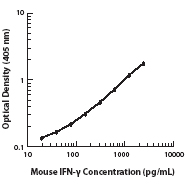
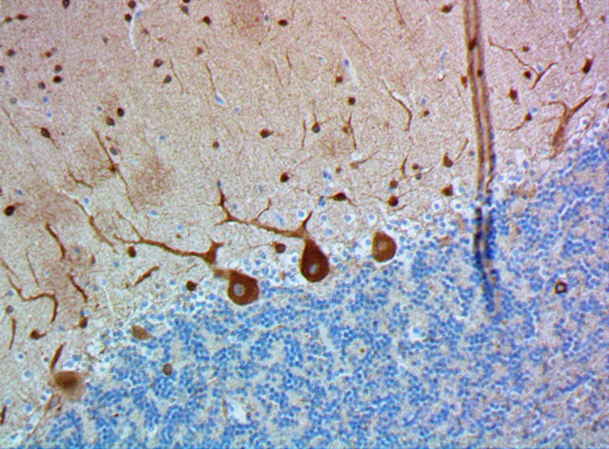
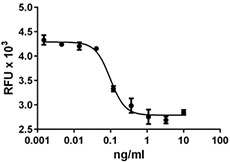
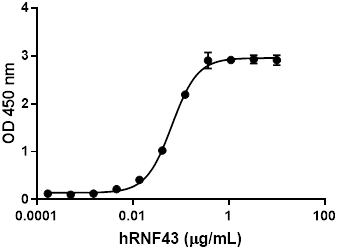



Follow Us